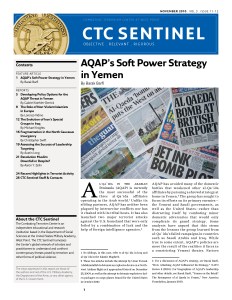Cover Story Overview
AQAP’s Soft Power Strategy in Yemen
Al-Qa`ida in the Arabian Peninsula (AQAP) is currently the most successful of the three al-Qa`ida affiliates operating in the Arab world. Unlike its sibling partners, AQAP has neither been plagued by internecine conflicts nor has it clashed with its tribal hosts. It has also launched two major terrorist attacks against the U.S. homeland that were only foiled by a combination of luck and the help of foreign intelligence agencies. AQAP has avoided many of the domestic battles that weakened other al-Qa`ida affiliates by pursuing a shrewd strategy at home in Yemen. The group has sought to focus its efforts on its primary enemies—the Yemeni and Saudi governments, as well as the United States—rather than distracting itself by combating minor domestic adversaries that would only complicate its grand strategy. This article details AQAP’s “soft power” strategy at home. As a result of its domestic maneuvering, AQAP is at times less of an international jihadist group than it is just another Yemeni organization battling the regime in Sana`a and playing by ever shifting local rules. Nevertheless, this article contends that AQAP’s “soft” approach at home is merely a tactical strategy since the group views itself as too weak to confront multiple enemies at this time. Indeed, AQAP remains firmly in the ideological camp of Abu Mus`ab al-Zarqawi and the Taliban.
 Skip to content
Skip to content

